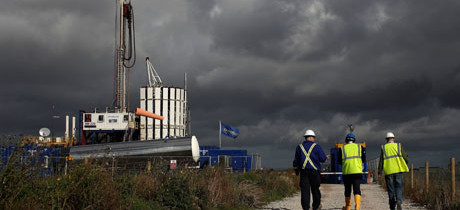Shale Gas Halted in U.K. by Six-Month Permit Wait: Energy
In Texas it takes seven days to get permission to use hydraulic fracturing to drill for oil and gas. In the U.K. the wait is six months. That difference helps explain why David Cameron’s dream of a fracking boom in the U.K., where there may be enough shale gas to meet the country’s demand for decades, has been slow to take shape. Britain under Cameron’s Conservative-led government is more pro-shale than anywhere in the European Union bar Poland. Yet since a moratorium was lifted in December 2012, not a single company has applied to frack in the country, even though the government offers some of the world’s richest exploration tax breaks. That’s got sobering implications for governments acrossEurope closely watching Cameron’s shale push.
“The U.K. would like to lead the shale gas revolution in Europe,” said Paul Stevens, distinguished fellow for energy at Chatham House in London. “But, if the U.K. can’t get this going, partly because of the environmental opposition, then that means Europe is even less likely to see results.”
Cameron says shale exploration will secure energy resources as North Sea reserves decline and help breathe life back into British rust-belt towns. His problem is that local authorities have to grant permission for wells, and anti-shale activists oppose drilling at every turn.
Immense Potential
A U.S. shale entrepreneur told a parliamentary committee last month that while the U.K. resource potential is “immense,” he won’t invest in the country because the approvals take too long. “If it takes a year to permit each one of those wells, no one will be around for the learning curve,” said Christopher Wright, chief executive officer of Liberty Resources LLC. “It won’t happen.”
The Bowland basin, extending across an area of northern England that includes Manchester, Liverpool and Sheffield, may hold as much as 1,300 trillion cubic feet of gas, the British Geological Survey says. That’s enough to meet demand for almost 50 years, based on an extraction rate similar to U.S. fields.
It’s a “simpler matter to get permission in other parts of the world,” Nigel Lawson, a member of the House of Lords in Cameron’s Conservative Party, said at a committee hearing last month. Explorers in the U.K. face a “bureaucratic muddle,” said Lawson, who was Margaret Thatcher’s chancellor of the exchequer and is the father of celebrity TV chef Nigella Lawson.
Holding Licenses
Energy Minister Michael Fallon said in August he expected 20 to 40 wells in two years.
Of six operators holding licenses, just one, IGas Energy Plc (IGAS), said it plans to frack at least one well this year, with at most two wells, according to a survey by Bloomberg News. Cuadrilla Resources Ltd. said it will submit an application for two sites in April or May and aims to start drilling next year.
By contrast, Poland is likely to drill about 30 wells and expects its first commercial flows in 2014. Some of those will be fracking wells.
“I do not accept we’re proceeding at a snail’s pace,” Fallon told the House of Lords committee. “We’re at the start of the process and I am confident it will lead in the fullness of time to substantial production.”
Fallon declined to comment beyond his statement.
Texas offers an expedited service for fracking permits in seven business days, and normally it takes about 11, according to the authority that handles applications. North Dakota averages 27 days, and by law Pennsylvania can take no longer than 45 days. The U.K. Onshore Operators Group, which represents the industry, said approvals take at least six months.
Waiting Time
The U.K. has plans to cut the waiting time for permits at the central government level and is considering changing access rights so explorers don’t need consent from property owners to drill under their land, according to the Department of Energy and Climate Change.
Still, once they’re past those hurdles, companies face judicial challenges from green groups.
“The government should end its reckless shale-gas dash,” Friends of the Earth campaigner Tony Bosworth said by e-mail. More communities are “facing up to the threat of fracking in their backyard.”
The only shale-gas well to be fracked to date, by Cuadrilla in Lancashire in 2011, was blamed for causing tremors, prompting the 18-month ban on drilling.
Land rights mean shale belongs to the Crown, so unlike the U.S., where owners get paid for the oil under their land, there’s little financial incentive for local communities to welcome explorers.
Cameron’s government has tried to sweeten the deal with a series of measures announced recently, giving local communities a greater share of taxes drillers pay and promising them 1 percent of production revenue once drilling starts.
“There’s a slim chance we’ll get to the hydraulic fracturing stage this year,” said Anish Kapadia, an analyst at Tudor Pickering Holt & Co. in London. “Public opposition is strong and the regulatory hurdles are onerous.”
Fonte: bloomberg.com



